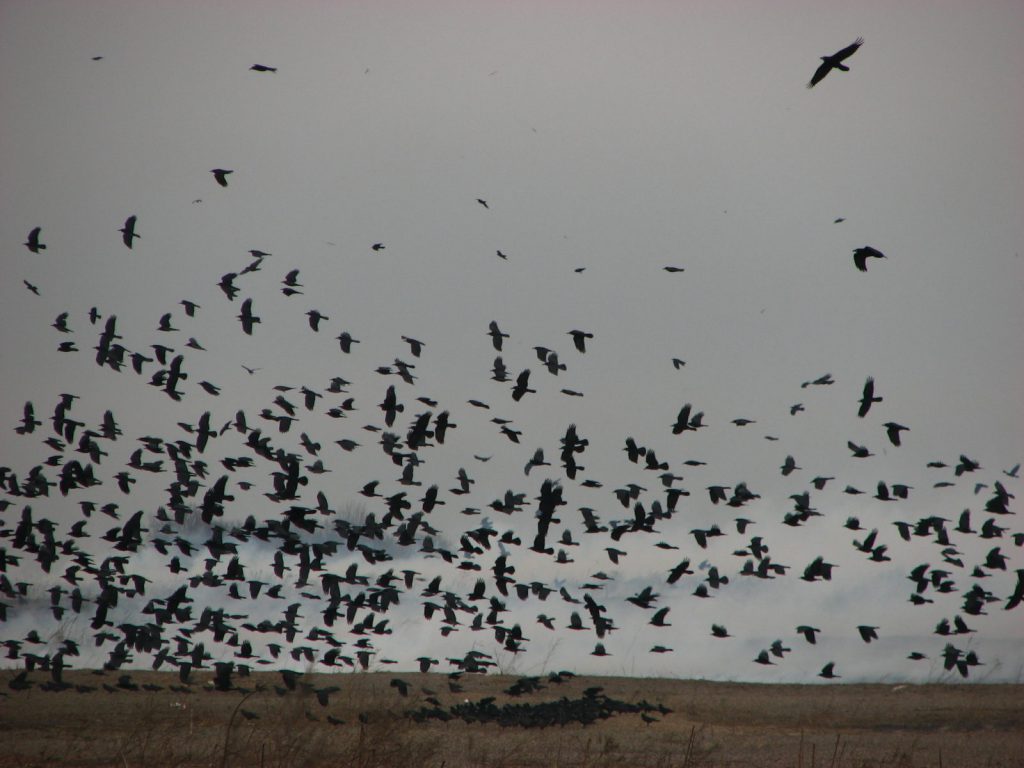
Published July 7, 2018
Some birds are known to engage in an activity called “mobbing.” The Sibley Guide to Bird Life and Behavior says it is “a poorly understood phenomenon in which one or more members of a species, or even several species in concert, chase, dive-bomb, or surround a predator or kleptoparasite, often vocalizing rigorously.”
Swallows, gulls and terns, crows, blackbirds and orioles, tyrant flycatchers and parids—all practice mobbing. The “enemy” may be a hawk, an owl, an eagle or a similar aggressor. Sometimes the mobbers merely make a commotion. Sometimes they get violent.
“The intent of such attacks,” the Sibley guide continues, “is largely to encourage the ‘enemy’ to move on to another area.” Mobbing, in other words, is justified self-defense (who can complain about that?) and arguably heroic. On the other hand, one ornithologist’s victim may be another’s villain. In the woods on my farm last week, I saw five crows tormenting an owl that was perched (for the moment innocently) in a tall white pine. The crows’ only motive seemed to be recreational malice.
But perhaps deeper urgencies of bird politics—even ideology—were at work. To human eyes, the hawk has the charm of his rakish and soaring self-sufficiency. The owl makes his living as a predator but nonetheless is an elegant and sympathetic creature. Yet to the crow, an able and highly intelligent character, there is no such thing as an innocent owl.
I thought of mobbing birds after two news items late last month. First the Red Hen restaurant in Lexington, Va., expelled White House press secretary Sarah Sanders —not exactly mobbing, but close: a territorial gesture meaning: Your kind is not welcome here. Immediately after that, Rep. Maxine Waters took it to the next level, encouraging a crowd to harass, like birds out of Hitchcock, members of the Trump administration anywhere they might be found. The mobbers say it is a matter of self-defense, a call to arms of their righteous indignation. Prepare yourself. Mobbing is about to become the style of American politics.
No side, left, right, or otherwise, has a monopoly on violence; even Tibetan Buddhist politics sometimes turns savage. Lately there has been a pattern of hit-and-run Antifa squads mobbing a protest or a fixed line of march. Having a parade permit does not make marchers virtuous, but it gives them, for the moment, the protection of the First Amendment. The mobbing birds—this is the dangerous part—believe that their righteousness supersedes the Constitution.
Political animals are animals first. When we think about American independence, patriotic memory, which always involves some gentrification, likes to emphasize the Enlightenment thought that went into the project. But the colonists also engaged in a certain amount of animal behavior—vandalism, rioting by torchlight, work with tar and feathers.
During Donald Trump’s second summer in office, the American self-image is vexed and complicated. There are immigration dramas on the border; there is a sudden vacancy on the Supreme Court that many find deeply ominous; there is intolerable suspense over what Robert Mueller might have turned up, or not. This Fourth of July, what one heard (at least from the left) was less John Philip Sousa than rising notes of anger and hysteria.
In a Rasmussen poll published last week, 31% of American voters said it was likely “that the United States will experience a second civil war sometime in the next five years.” At the news of Justice Anthony Kennedy’s retirement, New York magazine’s Frank Rich remarked that “the discrepancy between this Court’s decisions and the realities of the fast-evolving modern America beyond its chambers could lead to a national conflict as convulsive as the one that followed the Taney Court’s Dred Scott decision in 1857.”
One should not get carried away with the idea of a coming civil war. It’s always 1857 somewhere in America. Someone is always repeating the novelist John Dos Passos ’ line (published in 1936, in reference to the Sacco-Vanzetti case a decade earlier): “All right, we are two nations.” Lincoln warned that “a house divided against itself cannot stand,” but America has usually been a house divided, one way or another.
In unexpected fashion, that might have been the secret of the country’s success. Since its founding, America has been a dynamic of selves and anti-selves: North vs. South, East vs. West, rural vs. urban, agricultural vs. industrial, black vs. white, frontier vs. Ellis Island, redskin vs. paleface, wets vs. dries, labor vs. management, hawks vs. doves, liberals vs. conservatives, Chamber of Commerce vs. Students for a Democratic Society, neo-Nazi vs. Antifa. Everywhere you look in the American drama, you see doubles banging against each other.
But the 21st century may be different in crucial ways. The cultural and financial gap between elites and nonelites has become vast and seemingly unbridgeable. The elites inhabit the 21st century, and the nonelites, in effect, dwell in zones of the 20th. (Mr. Trump’s wistful frame of reference is the 1950s.) Political passions are intensified and driven to extremes by social media. Anxieties and divisions multiply. And the astonishment of imponderable Donald Trump presides. America is definitely crazier than it was a few years ago.
So it is possible to envision something like a new civil war, but not along the lines of 1861-65, with two clear geographical sides and large regular armies fighting pitched battles. Instead imagine high-tech mobs, an intifada with stones and drones, locals and irregulars in improvised warfare with the feds. America could devolve, slow-motion, into an archipelago of warlord states—like China after the collapse of the Qing Dynasty—pitting the coasts against the interior, with progressive fortresses at Austin, Texas, and other big university towns.
There are all sorts of Fort Sumters waiting to happen. A ruling by the Supreme Court to overturn Roe v. Wade? Or same-sex marriage? Or affirmative action? Suppose that Robert Mueller’s findings set off a constitutional crisis: Could Mr. Trump be removed from office? Could he be prosecuted while in office? No one envisions him departing quietly.
The Founders were fearful of mobs. Benjamin Franklin, with perfect accuracy, placed the principle of compromise at the center of the new American government. The essence of the problem today is that, between the crows and the owls, no compromise is possible. It was the same fatal impasse in 1860. Then again, it all might come to anticlimax. I have watched dozens of times as a group of crows—a murder of crows—has mobbed an owl, an eagle or a hawk. Frankly, these things tend to end when the crows get bored.
It would be nice if boredom proved to be the outcome of the current politics. But the likelier and somewhat darker denouement may be exhaustion, and a good deal of wreckage.
Mr. Morrow, a senior fellow at the Ethics and Public Policy Center, is a former essayist for Time.








